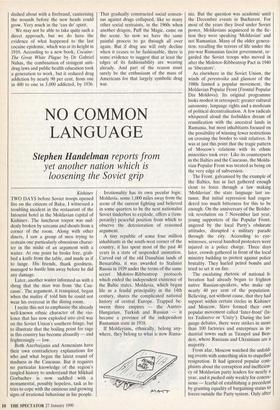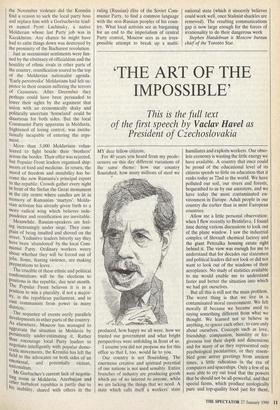NO COMMON LANGUAGE
Stephen Handelman reports from
yet another nation which is loosening the Soviet grip
Kishinev TWO DAYS before Soviet troops opened fire on the citizens of Baku, I witnessed a troubling incident in the restaurant of the lntourist hotel in the Moldavian capital of Kishinev. The luncheon torpor was sud- denly broken by screams and shouts from a corner of the room. Along with other diners, I saw a group of men trying to restrain one particularly obnoxious charac- ter in the midst of an argument with a waiter. At one point he broke free, grab- bed a knife from the table, and made as if to lunge. His friends, thank goodness, managed to hustle him away before he did any damage.
Later, another waiter informed us with a shrug that the man was from 'the Cau- casus'. The argument, it transpired, began when the maitre d' told him he could not wear his overcoat in the dining room.
I recite this not to emphasise the already well-known ethnic character of the vio- lence that has now exploded into civil war on the Soviet Union's southern fringe, but to illustrate that the boiling point for rage in this country has become absurdly — and frighteningly — low.
Both Azerbaijanis and Armenians have their own contradictory explanations for who and what began the latest round of madness in the Caucasus. But it requires no particular knowledge of the region's tangled history to understand that Mikhail Gorbachev is now saddled with a monumental, possibly hopeless, task as he tries to cope with the ominous and growing signs of irrational behaviour in his people. Irrationality has its own pecular logic. Moldavia, some 1,000 miles away from the scene of the current fighting and believed in some quarters to be the next nationalist Soviet tinderbox to explode, offers a (tem- porarily) peaceful position from which to observe the deterioration of reasoned argument.
A tiny republic of some four million inhabitants in the south-west corner of the country, it has spent most of the past 40 years in a state of suspended animation. Carved out of the old Danubian lands of Bessarabia, it was awarded to Stalinist Russia in 1939 under the terms of the same secret Molotov-Ribhentrop protocols which ended the independent existence of the Baltic states. Moldavia, which began life as a feudal principality in the 14th century, shares the complicated national history of central Europe. Trapped be- tween three empires — the Austro- Hungarian, Turkish and Russian — it became a province of the independent Rumanian state in 1918.
If Moldavians, ethnically, belong any- where, they belong to what is now RIMEL-
nia. But the question was academic until the December events in Bucharest. For most of the years they lived under Soviet power, Moldavians acquiesced in the fic- tion they were speaking 'Moldavian' and not Rumanian. Many of the older genera- tion, recalling the terrors of life under the pre-war Rumanian fascist government, re- garded the Soviet troops who moved in after the Molotov-Ribbentrop Pact in 1940 as 'liberators'.
As elsewhere in the Soviet Union, the winds of perestroika and glasnost of the 1980s fanned a popular movement, the Moldavian Popular Front (Frontul Popular Din Moldova). Its original programme looks modest in retrospect: greater cultural autonomy, language rights and a modicum of political decentralisation. A few radicals whispered aloud the forbidden dream of reunification with the ancestral lands in Rumania, but most inhabitants focused on the possibility of winning fewer restrictions on crossing the border to visit relatives. It was at just this point that the tragic pattern of Moscow's relations with its ethnic minorities took over. Like its counterparts in the Baltics and the Caucasus, the Molda- vian Popular Front was treated as being on the very edge of subversion.
The Front, galvanised by the example of the Baltics, has in fact gathered enough clout to force through a law making `Moldavian' the state language last au- tumn. But initial repression had engen- dered too much bitterness for this to be enough. On the anniversary of the Bolshe- vik revolution on 7 November last year, young supporters of the Popular Front, angered by the local Party's obdurate attitudes, disrupted a military parade through the city. According to eye- witnesses, several hundred protesters were injured in a police charge. Three days later, crowds gathered in front of the local ministry building to protest against police brutality. They hurled petrol bombs and tried to set it on fire.
The escalating rhetoric of national li- beration had already begun to frighten native Russian-speakers, who make up nearly 40 per cent of the population. Believing, not without cause, that they had support within certain circles in Kishinev and Moscow, Slays formed their own popular movement called 'Inter-front' (la- ter Yedinstvo or 'Unity'). During the lan- guage debates, there were strikes in more than 100 factories and enterprises in in- dustrial towns such as Tiraspol and Ben- deri , where Russians and Ukrainians are a majority.
From afar, Moscow watched the unfold- ing events with something akin to stupefied resignation. It had ignored popular com- plaints about the corruption and inefficien- cy of Moldavian party leaders for nearly a year, and it pushed only weakly for conces- sions — fearful of establishing a precedent by granting equality of bargaining status to forces outside the Party system. Only after the November violence did the Kremlin find a reason to sack the local party boss and replace him with a Gorbachevite lead- er named Pyotr Luchinsky, a native Moldavian whose last Party job was in Kazakhstan. Any chance he might have had to calm things down was, destroyed by the proximity of the Bucharest revolution.
Just as secessionist sentiments were fan- ned by the obstinacy of officialdom and the hostility of ethnic rivals in other parts of the country, reunification soared to the top of the Moldavian nationalist agenda. `Early-perestroika' Moldavians had felt su perior to their cousins suffering the terrors of Ceausescu. After December they perhaps could have been persuaded to lower their sights by the argument that union with an economically shaky and politically uncertain 'homeland' could be disastrous for both sides. But the local Communist Party apparatus in Moldavia, frightened of losing control, was institu- tionally incapable of entering the argu- ment,
More than 5,000 Moldavians volun- teered to fight beside their `brothers' across the border. Their offer was rejected, but Popular Front leaders organised ship- ments of food and medicine. In return, the mood of freedom and instability has be- come the new Rumania's principal export to the republic. Crowds gather every night in front of the Stefan the Great monument in the city centre where candles are lit in memory of Rumanian 'martyrs'. Molda- vian activism has already given birth to a more radical wing which believes inde- pendence and reunification are inevitable.
Meanwhile, Russian-speakers are feel- ing increasingly under siege. They com- Plain of being insulted and shoved on the street. Yedinstvo leaders bitterly say they have been 'abandoned' by the local Com- munist Party. Ordinary workers worry 'bout whether they will be forced out of Jobs. Some, fearing violence, are making preparations to leave.
The crucible of these ethnic and political confrontations will be the elections to Positions in the republic, due next month. The Popular Front believes it is in a Position to win a plurality, if not a major- hY, in the republican parliament, and to oust communists from power in many districts.
The sequence of events eerily parallels developments in other parts of the country. As elsewhere, Moscow has managed to aggravate the situation in Moldavia by Persistently under-estimating it. Rather than encourage local Party leaders to negotiate intelligently with popular demo- Cratie movements, the Kremlin has left the field to the advocates on both sides of an emotional, and potentially violent, nationalists, Mr Gorbachev's current lack of negotia- ting room in Moldavia, Azerbaijan and other turbulent republics is partly due to hts inability, shared with others in the
ruling (Russian) elite of the Soviet Com- munist Party, to find a common language with the non-Russian peoples of his coun- try. What local activists see as bargaining for an end to the imperialism of central Party control, Moscow sees as an irres- ponsible attempt to break up a multi- national state (which it sincerely believes could work well, once Stalinist shackles are removed). The resulting communications gap is now large enough for the forces of irrationality to do their dangerous work
Stephen Handelman is Moscow bureau chief of the Toronto Star.



























































 Previous page
Previous page